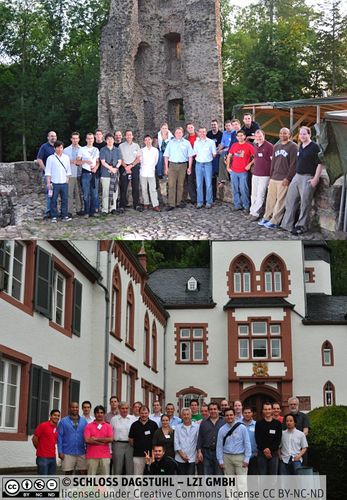Dagstuhl Seminar 09341
Cognition, Control and Learning for Robot Manipulation in Human Environments
( Aug 16 – Aug 21, 2009 )
Permalink
Organizers
- Michael Beetz (TU München, DE)
- Oliver Brock (TU Berlin, DE)
- Gordon Cheng (ATR - Kyoto, JP)
- Jan Peters (MPI für biologische Kybernetik - Tübingen, DE)
Contact
Schedule
High performance robot arms are faster, more accurate, and stronger than humans. Yet many manipulation tasks that are easily performed by humans as part of their daily life are well beyond the capabilities of such robots. The main reason for this superiority is that humans can rely upon neural information processing and control mechanisms which are tailored for performing complex motor skills, adapting to uncertain environments and to not imposing a danger to surrounding humans. As we are working towards autonomous service robots operating and performing manipulation in the presence of humans and in human living and working environments, the robots must exhibit similar levels of flexibility, compliance, and adaptivity.
The goal of this Dagstuhl seminar is to make a big step towards pushing robot manipulation forward such that robot assisted living can become a concrete vision for the future. In order to achieve this goal, the computational aspects of everyday manipulation tasks need to be well-understood and the interaction of perceptual, learning, reasoning, planning, and control mechanisms thoroughly investigated. The challenges to be met include cooperation with humans, uncertainty in both task and environments, real-time action requirements, and the use of tools. The challenges cannot be met by merely improving the software engineering and programming techniques. Rather the systems need built-in capabilities to deal with these challenges. Looking at natural intelligent systems, the most promising approach for handling them is to equip the systems with more powerful cognitive mechanisms.
The potential impact of bringing cognition, control and learning methods together for robotic manipulation can be enormous. This urge for such concerted approaches is reflected by a large number of national and international research initiatives including the DARPA cognitive systems initiative of the Information Processing Technology Office, various integrated projects funded by the European Community, the British Foresight program for cognitive systems, huge Japanese research efforts, to name only a few.
As a result, many researchers all over the world engage in cognitive system research and there is need for and value in discussion. These discussions become particularly promising because of the growing readiness of researchers of different disciplines to talk to each other.
Early results of such interdisciplinary cross-fertilization can already be observed and we only intend to give a few examples: Cognitive psychologists have presented empirical evidence for the use of Bayesian estimation and discovered the cost functions possibly underlying human motor control. Neuroscientists have shown that reinforcement learning algorithms can be used to explain the role of dopamine in the human basal ganglia as well as the functioning of the bee brain. Computer scientists and engineers have shown that the understanding of brain mechanisms can result into reliable learning algorithms as well as control setups. Insights from artificial intelligence such as Bayesian networks and the associated reasoning and learning mechanisms have inspired research in cognitive psychology, in particular the formation of causal theory in young children.
These examples suggest that (1) successful computational mechanisms in artificial cognitive systems tend to have counterparts with similar functionality in natural cognitive systems; and (2) new consolidated findings about the structure and functional organization of perception and motion control in natural cognitive systems indicate in a number of cases much better ways of organizing and specifying computational tasks in artificial cognitive systems.
- Rachid Alami (LAAS - Toulouse, FR) [dblp]
- Michael Beetz (TU München, DE) [dblp]
- Sven Behnke (Universität Bonn, DE) [dblp]
- Oliver Brock (TU Berlin, DE) [dblp]
- Dražen Bršcic (TU München, DE)
- Wolfram Burgard (Universität Freiburg, DE) [dblp]
- Gordon Cheng (ATR - Kyoto, JP)
- Ernst Dickmanns (Universität der Bundeswehr - München, DE)
- Andreas Fedrizzi (TU München, DE)
- Brian Gerkey (Willow Garage, Inc. - Menlo Park, US)
- Joachim Hertzberg (Universität Osnabrück, DE) [dblp]
- Koh Hosoda (Osaka University, JP)
- Odest Chadwicke Jenkins (Brown University - Providence, US)
- Dov Katz (University of Massachusetts - Amherst, US)
- Charles C. Kemp (Georgia Institute of Technology - Atlanta, US) [dblp]
- Oussama Khatib (Stanford University, US)
- James Kuffner (Carnegie Mellon University - Pittsburgh, US)
- Alexis Maldonado (TU München, DE)
- Matthew T. Mason (Carnegie Mellon University - Pittsburgh, US) [dblp]
- Takamitsu Matsubara (Nara Institute of Science and Technology, JP)
- Giorgio Metta (Italian Institute of Technology - Genova, IT)
- Michael Mistry (Disney Research - Pittsburgh, US)
- Kei Okada (University of Tokyo, JP) [dblp]
- Angelika Peer (TU München, DE)
- Jan Peters (MPI für biologische Kybernetik - Tübingen, DE) [dblp]
- Martin Riedmiller (Universität Freiburg, DE) [dblp]
- Radu B. Rusu (TU München, DE)
- Jürgen Sturm (Universität Freiburg, DE) [dblp]
- Marc Toussaint (TU Berlin, DE) [dblp]
- Patrick van der Smagt (DLR - Oberpfaffenhofen, DE)
- Martijn van Otterlo (KU Leuven, BE) [dblp]
Classification
- artificial intelligence
- robotics
- machine learning
- cognition
Keywords
- manipulation
- cognition
- control
- learning
- humanoid robot
- unstructured environments


